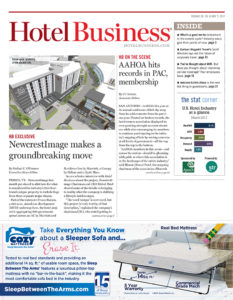 Last year, Scott Brennan became president of the newly formed hotel supplier group at Carlson Wagonlit Travel (CWT). Prior to that, he was EVP and head of global supplier management, and has held roles with companies ranging from Rocketmiles to Hilton. Tasked with growing CWT’s hotel business and ensuring its clients, suppliers and travelers receive a differentiated value proposition, Brennan shared his insights on the industry.
Last year, Scott Brennan became president of the newly formed hotel supplier group at Carlson Wagonlit Travel (CWT). Prior to that, he was EVP and head of global supplier management, and has held roles with companies ranging from Rocketmiles to Hilton. Tasked with growing CWT’s hotel business and ensuring its clients, suppliers and travelers receive a differentiated value proposition, Brennan shared his insights on the industry.
How would you describe the division’s overall strategy? We are focused on delivering the best, most competitive and relevant content to our travelers while helping traveler managers improve compliance and generate savings. To do this, we are investing heavily in distribution technology to ensure consistent content and experience across all booking channels; superior content acquisition; and innovative solutions that will provide travelers with a personalized and unique experience.
How bullish are you on the coming year for the industry? What factors are driving and influencing this? Our expectation for lodging is continued growth in transient room demand.
The distribution market is extremely crowded between GDS’, OBTs (online booking tools), OTAs, consolidating hotel brands, hotel corporate booking agencies and TMCs (travel management companies) all looking to meet the travelers’ lodging needs. The end result is more sources of content, more traveler and client confusion and, ultimately, an erosion of a company’s travel program with hotel leakage averaging around 40%, and growing despite travel managers seeking to rationalize their hotel programs. There is a huge opportunity to simplify this. We are making bold investments in technology, innovation and our people to challenge the status quo in business travel.
What have been some of the biggest lessons you’ve learned over the years? I saw that loyalty and recognition were key influencers in people’s purchase behaviors and how this was prevalent in the travel industry during my time at Hilton and Rocketmiles. However, I also discovered that this was not mainstream in the TMC world and that we could leverage new opportunities to enhance the business traveler’s experience while supporting the travel manager’s objectives of saving money, ensuring duty of care and improving traveler happiness.
What is the industry doing wrong with regard to business travelers and booking? The experience of researching and booking travel has been far too fractured. Travelers may book a flight and even a car in one place, but then they go to another to look up hotels by region, another to read reviews and make comparisons, and others to hunt down the best rates. Much of this often occurs outside corporate booking channels. As a result, the distribution industry has become even more fragmented, making travelers lives more difficult, as well as requiring traveler managers to contract, source and consolidate multiple third parties. The consequence is that hotel attach rates are not often as high as they should be.
Travelers need a true one-stop shop where they have access to the most relevant and most competitive inventory, supported by descriptive and user-generated content, such as reliable peer review, and personal benefits like bonus loyalty points. For this reason, CWT is simplifying the entire booking experience by delivering a true one-stop across all channels: online, offline and mobile to deliver relevant traveler perks.
How do you see the evolution of the loyalty space affecting corporate travel? According to GBTA, 72% of travel managers are interested in allowing travelers to accrue points more quickly if they booked through a channel agreed upon by both the travel manager and the hotel. GBTA research also indicates that 86% of corporate travel managers agree hotel loyalty programs play an important role in their negotiations with hotels. But for the last 20 years, supplier loyalty programs have been underutilized within TMC channels. Loyalty incentives have often been seen as a reason for noncompliance and the traveler has been stuck in the middle, booking in one place but getting additional incentives in another. The importance of loyalty is here to stay and will expand. We strongly believe that loyalty will become a greater differentiator for business travelers and more prevalent in the way companies seek to manage their travel programs.
CWT is an industry leader in this change and uses additional loyalty to increase traveler satisfaction, loyalty, compliance and safety. Our loyalty benefits will be carefully targeted for each traveler, based on preferred suppliers and travel destinations, and combined with travelers’ tendencies for specific travel behaviors.
What disrupters do you have your eye on? Data, I believe, will definitely have the strongest impact on our industry. It will be the core of a company’s capability to differentiate itself from the competition, and those that are the most astute and forward thinking will benefit from a clear advantage. Indeed, data is the backbone of sales strategies all the way to the traveler’s booking experience.
There are a lot of disrupters in the industry across all areas and geographies. Ultimately, those that will be successful are those that will be able to provide an improved experience to the traveler and integrate seamlessly in systems that are often complex.
Also, economy sharing isn’t going away any time soon. Travelers—in particular, younger travelers or travelers who have extended stays where no extended hotel properties are available—like having the option of economy-sharing properties. They are willing to give up some luxury and conveniences in order to find better rates and more particular products and services. The industry will find ways to marry the sharing economy with the traditional hospitality industry to maximize variety of choice for the traveler, while we help to ensure the security, safety and reliability of the options.
Looking to hospitality’s future, where do you see the business travel world in five years? Advances in technology and artificial intelligence will impact business travel in years to come as travelers’ expectations and needs will continue to evolve. Data will be a key contributor to deliver a personalized and integrated experience to travelers. For example, the technology is already there for travelers to be recognized and have their room assignments and virtual room keys in hand without having to go to the reception area. And, this is just the beginning.
Also, as a reflection of the global dynamics, travel risk management will remain a top consideration. Clients will continue to seek solutions that help mitigate risk and provide solutions for their travelers in all situations. HB

